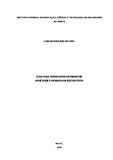Guia para modelagem de projetos aplicados à mobilidade sustentável

Visualizar/
Data
2024-12-12Autor
Lima, Carlos Eduardo de
https://lattes.cnpq.br/9936352663376121
Metadado
Mostrar registro completoResumo
The concept of smart and sustainable cities has proven to be complex and grand, allowing it to
be observed by different analytical currents and one of them relates to the construction of its
digital model, focused on solving infrastructure problems for mobility. As a practical matter,
this study seeks guidelines for adapting current processes, concerning the modeling of projects
for this branch of engineering, based on sustainability, aiming at collaboration for the
Sustainable Development Goals of the 2030 Agenda. Those involved in the project segment for
mobility infrastructure, are the focus audience of this study, whether they are independent
service providers, as well as employees from the private or public sector. The general objective
is to list types of sustainability analyses in modeling urban mobility systems and, with this,
propose a guide aimed at those involved in transport and mobility infrastructure engineering,
for conducting projects and modeling the built space with sustainability. The specific objectives
are: to explore sustainability indicators, identify barriers to the implementation of BIM in this
sector and a guide and a model for a BIM Execution Plan, capable of assisting in attracting
resources to finance works based on sustainability. In essence, this research is
multidisciplinary, supported by environmental sciences for civil and transport engineering, has
an applied nature, descriptive, exploratory, analytical and prescriptive purposes and the
premise of knowledge rests on inductivism, based on observation. The research method is based
on Design Science Research, which has been a rigorous scientific path, conducting studies
aimed at solving problems, with the aim of building artifacts applied in the transformation of
protocols. In the meantime, a set of research techniques were employed, such as: systematic
literature review, bibliographic review, questionnaire application, content analysis and case
study. Preliminary results show that the processes in project development are inherent to the
structural culture of organizations, allowing the delineation of diversified flow maps. A great
rush has been noticed in recent days among scholars in this area of research, as it was full of
gaps to be resolved, a fact that posed a huge challenge in monitoring it. It was also found that
the simple application of computational solutions with geographic information systems or
construction information modeling do not replace the use of on-site topographic surveys to
obtain digital surface models. However, there are rigid standard steps that, when neglected,
can easily result in unnecessary revisions and rework. With this, the technical artifact continues
in the phase of providing robust information, for subsequent initial validation in an initial and
continuing training course.



